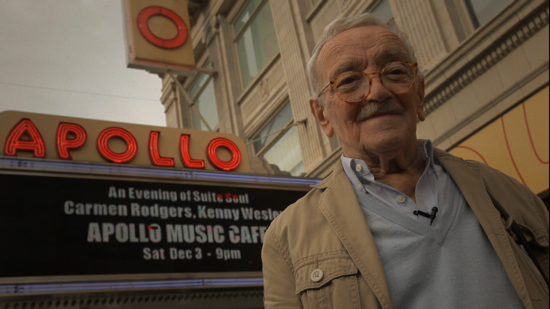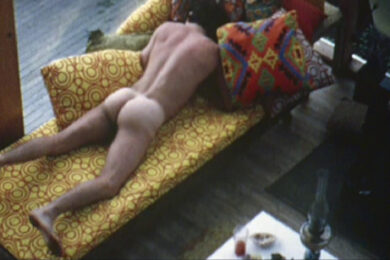"The eternal search for the perfect prick" – this has been what Peter de Rome’s life is all about, according to the man himself. When he wrote his autobiography, The Erotic World of Peter de Rome, in 1984 he wasn’t so much relating the events and experiences of the past 60 years as he was recounting his sexual history. Here was a man who had participated in D-Day and become active in the civil rights movement during the early sixties and yet, for de Rome, they serve almost solely as excuses to relate another opportunistic sexual encounter with some young boy or other. In the days leading up to the Normandy landings it’s a Mauritian volunteer by the name of Papillon. During a peaceful protest following the murder of Alabama postal worker William Lewis Moore (a lone white voice of dissent against racial segregation) it’s a homesick 18-year-old. The pattern continues for almost 200 pages.
If you’re looking for the facts then The Erotic World of Peter de Rome isn’t the best starting point. The narrative of de Rome’s life needs to be carefully read between his many couplings. Indeed, we aren’t even told when he was born; life begins at 11, it would appear, when he achieved orgasm at the hand(s) of his brother’s friend. Nonetheless, this much we do know: de Rome was still a schoolboy at the outbreak of World War II and became an evacuee. Once he’d reached school leaving age he began work in a Lancashire mill and appeared to be following in his father’s footsteps in the cotton trade. The war was still in motion so he enlisted in the RAF with romantic ideas of becoming a pilot, but poor eyesight put an end to this. The years until demob were occupied by administrative posts, that volunteer from Mauritius and plenty of other partners, plus the life-changing effects of seeing Ivor Novello perform for the troops. Upon returning to Britain the Lancashire mill was traded for the Birmingham Repertory Theatre, which soon gave way to London and work as a film publicist for, initially, Alexander Korda and then David O Selznick.
It was the American producer who prompted de Rome to up sticks to New York. A fresh adaptation of Hemingway’s A Farewell To Arms was in the works and the young Brit looked set to play a prominent role behind the scenes. Hollywood being Hollywood, the project became blighted with rewrites, changes in personnel and delays which effectively rendered de Rome unemployed. Thus he departed the film industry – or at least the professional film industry – for good and went to work as a salesman at Tiffany’s. According to his book, the job wasn’t all that interesting but some of his co-workers were – and they would regularly take advantage of the store’s secluded basement.
Once the civil rights movement caught his attention – spurred on by de Rome’s sexual interest in the African-American male – he said goodbye to Tiffany’s. Around this time he’d also picked up an 8mm home movie camera for no reason other than having been bombarded with advertising. It came in handy during his trips to the South as a means of recording this unfamiliar landscape, though there were other uses too. De Rome’s first time behind the camera was spent recording himself, nude, in the front of the mirror. He shot for a few feet of the reel and was sure to include ‘safe’ material either side so that its true nature would escape the attention of Kodak’s developers. Even though this first experiment was comparatively tame, the legality of such material – this being the early sixties – was in question. Kodak hadn’t noticed, however, and so de Rome went one step further, this time masturbating for the lens. Once again, the developers carried out their work without any alarm. Even though de Rome was now in his forties and had a whole range of experiences behind him, a filmmaker was born.
Given the legal issues, these early efforts were intended solely for private consumption. He would host parties for his friends in his New York apartment and screen them via a tiny projector. Initially the performers were made up of those he had approached on the streets, utilising that same opportunist spirit he’d adopted throughout his sex life. Indeed, the films were in many ways an extension of this, either as masturbatory tools or the occasional chance for de Rome himself – the unfulfilled stage actor of Birmingham Rep – to put in a performance. However, these weren’t simple stag loops (the mere concept is derided as "exceedingly boring" in the autobiography): they contained a certain artistry and maybe even had a tale to tell. As de Rome put it, the sex was "a secondary, though essential, part". The effect wasn’t lost on his audiences, who were unanimous in their praise and would recommend potential future stars from their friends and acquaintances. Ultimately, they would also prompt a shift towards foreign festival audiences and even the cinemas of the United States.
De Rome’s first public screening came at the First International Wet Dream Film Festival in Amsterdam in 1971. The film was Hot Pants, an eight-minute short of acquaintance Jonny Robinson dancing to James Brown in an increasing state of excitement. Framed so that only the portion of Robinson’s body between his chest and his knees was in shot, the result met with praise from British critic David Robinson as "an elevated celebration of sex which goes altogether beyond any notions of pornography, and indicates that de Rome is a filmmaker of substantial gifts". Amazingly, this review appeared in the Financial Times, the first sign of international recognition, along with the short picking up its category’s top prize.
The second was an approach by producer Jack Deveau the following year. He’d been to one of the apartment screenings and proposed a feature-length compilation of his shorts, blown up to 16mm and given theatrical distribution. Six titles were chosen and production commenced on a further two in order to differentiate the material and add a more hardcore edge, such was the trend at the time. The Erotic Films of Peter de Rome, as the collection became known, premiered in April 1973 at the Lincoln Art Theater in New York where it played for a number of weeks and received plenty of favourable notices. The gay press were fans, but so too were mainstream publications including Variety.

Almost 40 years since that premiere, de Rome’s compatriots can now sample his work. The Erotic Films of Peter de Rome, or indeed any of his films, have never seen a commercial release in the UK. In order to catch them you had to be a rare exception such as Sir John Gielgud, who would regularly attended the apartment screenings and had once suggested to de Rome an unrealised plot set in the changing rooms of a gentlemen’s tailors. Of course Gielgud had connections unlikely to extend to the majority, and so we must offer our thanks to the British Film Institute who acquired the original 8mm materials back in 2007 and in the years since have somehow secured an entirely uncut release from the BBFC – no mean feat considering much of the explicit and undoubtedly hardcore activity on display.
The BBFC’s justification for the 18 certification (as opposed to the R18 which can only be sold in sex shops) comes down to the "artistic, cultural and historical merit" as well as the "tone and treatment". In other words, it’s because de Rome tried to make something more than mere titillation that we’re able to order the disc from Amazon or pop into our nearest HMV. There’s a discernibly innocent quality to these films, not to mention an honesty, that’s really quite refreshing. Because de Rome had no intention of an audience outside of his immediate circle, he could effectively go where he liked with them. If he wanted to channel Maya Deren and demonstrate his more experimental side in Double Exposure, then he could. Conversely, if he wanted to gleefully show an erection bouncing around in slow motion, as Hot Pants provides, then he could do that too. Even if he felt the need to top off the globe-trotting travelogue of The Second Coming with the bizarre image of a crucified young male ejaculating, then that was also entirely possible. De Rome was simply channelling his own fantasies and presenting them as he saw fit. There was never any commercial interest at stake, nor was there any kind of sexual activity quota to fulfil. Some of the titles are really quite tame, others really quite full-on, yet in all cases, he’s simply following the demands of the material.
Not that we’re entirely safe from pornographic clichés. At times these films can be a little too obvious or a little too vague to satisfy purely as pieces of narrative, but then who am I to question de Rome’s fantasies? The outstanding titles are the ones which either remove any sign of storytelling whatsoever or opt for a more concentrated approach. Contemporary reviews were quick to highlight the specially filmed Underground and it remains a standout today. A scruffy longhair and a respectable-seeming gent in a suit and tie engage in a bit of explicit activity on the New York underground. There were no studio sets, indeed no signs of artifice whatsoever; as de Rome has pointed out since, "there was no way it could have been faked". The cruising scenes were shot early morning with the sex scenes recorded late at night so as to avoid as many passengers as possible. Even so, there’s no denying the frisson and tension of it all – the suspense is immediate and, more importantly, it’s entirely authentic.
Real life bleeds into the films in other ways too. Watching from a 40 year distance it’s hard not to see them as a window onto a distant past. The locations, the clothing and the bodies – all captured vérité-style thanks to the 8mm gauge and its lo-fi charm – immediately signal the late sixties/early seventies, but so too does the freedom of it all. The Erotic Films of Peter de Rome are a pre-AIDS landscape blind to the divides of class or race but wide awake to possibility. Their brief encounters and bouts of exhibitionism are simple, unencumbered by worries or fears and, consequently, now strike the viewer as strangely innocent. Fittingly, de Rome retired from filmmaking in 1979 just as that era was coming to an end.
The Erotic Films of Peter de Rome are out today on DVD; complete details at the BFI Filmstore website. Included as an extra on the release, Ethan Reid’s documentary Fragments: The Incomplete Films of Peter de Rome screens at NFT2 this Friday March 30 as part of the London Lesbian & Gay Film Festival (trailer below). Peter de Rome’s work also features on a new BFI shorts collection titled Encounters: Four Ground-breaking Classics Of Gay Cinema.
Fragments from ethan reid on Vimeo.



